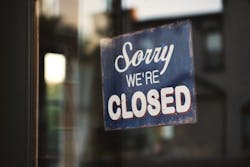March 20, 2020—The first statewide stay-at-home order came down in California on March 19 amid the COVID-19 outbreak. Gov. Gavin Newsom signed an executive order for residents to remain at home to prevent the spread of the virus. New York followed with a similar order a day later.
In reality, 100 percent of people wouldn’t be at home at all times. Residents could still leave their homes for certain activities, and the employees at those businesses were allowed to stay open. This reinforced the importance of which businesses are deemed “essential” and which ones are “nonessential.”
“The supply chain must continue, and Californians must have access to such necessities as food, prescriptions, and health care,” Newsom’s order said.
Organizations like the Automotive Oil Change Association acted early to support the designation of quick lubes as “essential” so that businesses could remain open if they could safely do so.
But across the country, shops still faced the difficult decision of staying open during a pandemic, as well as the inability to control the drop in business as communities hunker down and the economy slows.
What is Essential?
Early in the week, as different local governments were adopting various orders or recommendations affecting essential business activities, the status for quick lubes wasn’t crystal clear.
Automotive shops in general have been deemed essential. A Nevada state order to close non-essential businesses, for example, listed “auto repair services” as essential. Whether or not that includes quick lube facilities might be open to interpretation for someone not directly involved in the industry.
“The Departments of Health issuing these orders aren’t parsing the differences between types of repair and maintenance facilities that comprise the automotive service sector the way such an in-depth discussion might be relevant for a Bureau of Automotive Repair,” Joanna Johnson, AOCA’s policy director, told NOLN in an email exchange. “That said, however, they or their enforcement agents—who also cannot be expected to have industry expertise—may misunderstand the breadth of the automotive service sector required to provide necessary services.”
That’s why the AOCA released a letter calling for a quick lube-specific designation as essential. The letter also urged operators to contact their legislators to clarify that definition.
By March 19, federal guidance emerged. The U.S. Department of Homeland Security’s Cybersecurity and Infrastructure Security Agency (CISA) issued a memo on essential critical infrastructure.
The memo includes, beneath the transportation and logistics section, “automotive repair and maintenance facilities.” This, to the AOCA, helped to reinforce the position of quick lubes as essential by including the reference to preventative maintenance services.
As California issued its statewide order on March 19, it referenced that CISA memo as a way to identify essential business sectors that remained open.
Shops Face Tough Decisions
Whether defined as essential or not, quick lubes remain in a precarious spot. Operators have to determine whether the cost of remaining open is too great when faced with slowed business.
Different areas of the country are seeing varied levels of customer traffic, though the macro-level picture suggests a severe slowdown. Layoffs and unemployment claims skyrocketed over the week of March 16.
Making things much harder for shop owners is the public health question: Does staying open risk expanding an already serious virus outbreak?
Nevada Gov. Steve Sisolak ordered the closure of nonessential businesses on March 17. It was part of a broader strategy that, put simply, is intended to keep people more than six feet apart.
“The goal of this Initiative is to protect the health and safety of Nevadans by preventing people coming together unnecessarily, where people who have the infection can easily spread it to others,” Sisolak’s order said.
Making the Call
That weighed on Bob Seltzer’s mind as he made the tough decision to temporarily close down his shop, Instant Lube in Sparks, Nev., to help reduce the virus’ spread.
Seltzer is based in Las Vegas, where the massive gaming industry saw an unprecedented shutdown amid the coronavirus outbreak. That signaled a serious public health risk, he says.
“When you see every gaming machine in Nevada shut down, this is serious,” Seltzer says.
The gravity of the outbreak is what led him to the decision to close. He says the business was in a financial position to be able to weather the temporary shutdown and make sure its employees weren’t left without help. For operations on much slimmer margins, Seltzer understands how difficult a decision must be.
“I want to do my civic duty,” Seltzer says. “My obligation is not only to my employees, but to my community.”
For him, that obligation is twofold. At the quick lube shop, it meant a temporary closure to help minimize contact between people. He’s also the president of Automotive Equipment of Nevada, a supply company whose clients include critical operations like ambulance services and city fleets.
That business remained open, albeit with lots of strict safeguards to minimize contact.
“I'm really torn,” he says. “I’m shutting down one business and keeping another going.”
While the situation has changed from day to day at local, state and federal levels, shop owners are no doubt facing the same difficult decisions. For Seltzer, the risk of spreading the virus outweighed the risk of business lost during this time.
He says that people in his community will understand.
“Our customer base is solid,” Seltzer says. “Thirty days from now, when this is over, the dust settles, our customers are going to come in and thank us.”
About the Author
Matt Hudson
Content Director
Matt Hudson is the former content director for National Oil and Lube News.

